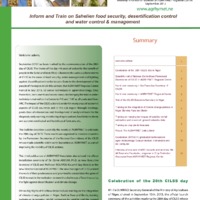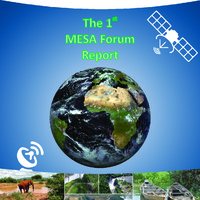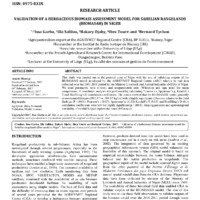Recherche
15 items
Conflict sensitivity and prevention (CSP)
Checklist for the implementation of livestock sector activities or infrastructure projects in sub-Saharan pastoral areas The Conflict Sensitivity and Prevention (CSP) Checklist was developed as part of the "Pastoralism and Stability in the Sahel and Horn of Africa" programme (PASSHA, 2016-2017, World Bank). The PASSHA programme was
designed to support CILSS (the Permanent Inter-State Committee for Drought Control in the Sahel) and IGAD (the Inter-Governmental Authority on Development). It aims to integrate the Conflict Sensitivity and Prevention approach into the interventions of both institutions and strengthen their capacity in this area. Its content has been improved in the framework of the implementation of the Integrated and Secure Pastoralism in West Africa Project (PEPISAO 2018-2022). The checklist is a field tool associated with the Practical Guide to Conflict Sensitivity and Prevention in Livestock Sector Development Projects in Sub-Saharan Africa. It has been tested within the framework of the Sahel Regional Pastoralism Support Project (PRAPS) and the Regional Pastoral and Livestock Resilience Project (RPLRP) respectively. If you are new to the checklist, please first read the Practical Guide
Decision support note on Mobile Livestock Systems (MLS) in West Africa and' the Sahel (WAS)
This decision support note is the second to materialize the operationalization of the Observatory of Mobile Livestock Systems in West Africa and the Sahel (OSEMAOS); an information platform piloted by the AGRHYMET Regional Center of CILSS in collaboration with ECOWAS and WAEMU. It deals with the pastoral situation from June to November 2024 based on data and informations transmitted by the focal points of the countries, by the Professional Organizations of breeders, pastoralists and farmers, local and cross-borderinter-communities.
Ensuring peaceful livestock mobility
Mobile livestock production in the Sahel and West Africa is a way of life and a form of adaptation and resilience developed over thousands of years by pastoralists and agro-pastoralists to cope with the effects of desertification and climate change, and to make the best use of the vast expanses of arid and semi-arid regions. This livestock farming system makes it possible to seek complementarities with the agro-ecological zones of the southern savannah regions through the use of pasture and water. In this way, livestock farming helps to provide substantial income for the local population and ensure food security. The N’Djamena symposium in the Republic of Chad (May 2013) and the Nouakchott declaration in the Islamic Republic of Mauritania (October 2013) gave renewed interest to the livestock sector with the implementation of several regional initiatives such as PRAPS, PREDIP, PEPISAO financed respectively by the World Bank, the European Union and the Agence Française de Développement and coordinated by CILSS as well as others such as PACBAO, MOPSS, etc.
Ensuring peaceful livestock mobility
Livestock farming plays a central role in the national and regional economies of West
Africa. It accounts for up to 10-15% of the GDP of the Sahelian states1 and contributes
to the local economies of the host areas of transhumant livestock farmers2. It is a major
source of income and employment throughout the sector, providing up to 99% of the red
meat consumed in the sub-region. Pastoral and agropastoral livestock farming systems,
based on the mobility of livestock, are still largely dominant in the sub-region. Several
regional pastoral development initiatives, such as the Projet régional d’appui au
pastoralisme au Sahel or Sahel Regional Pastoralism Support Project (PRAPS), the
Projet régional de dialogue et d’investissement pour le pastoralisme et la transhumance au Sahel et dans les pays côtiers de l’Afrique de l’Ouest or Regional dialogue and Investment Project for Pastoralism and Transhumance in the Sahel and Coastal Countries of West Africa (PREDIP) and the Projet Elevages et pastoralisme intégrés et sécurisés en Afrique de l’Ouest or Integrated and Secure Livestock Production systems and Pastoralism in West Africa Project (PEPISAO), have been developed and implemented by the Permanent Inter-state Committee for Drought Control in the Sahel (CILSS).
Evaluation of the regulatory framework for pastoralism and cross border transhumance in West Africa and the Sahel
i) The Economic Community of West African States (ECOWAS) is a pioneer in establishing regulations for the exercise of cross-border transhumance, a somewhat controversial livestock production system in relation to its economic, social and environmental impacts, and the conflicts of access to natural resources that are sometimes associated with it.
ii) Since 1998, ECOWAS has been experimenting with a set of legal and technical instruments to provide a framework for the exercise of this multi-functional credited activity, which makes it a powerful means of strengthening the resilience of populations in general, and pastoralist and herder households in particular, on the one hand, and promoting social and regional integration in West Africa, on the other.
Informative directory on regulations an agreements related to the prevention and management of pastoral conflicts in the Sahel and West Africa Volume 1 : ECOWAS and central couloir country of trahsnumance (Bénin, Burkina Faso, Niger et Togo)
Pastoralism and transhumance are livestock production practices in Africa in general and West Africa in particular. Moreover, continental, sub-regional and national organisations consider that pastoralism is useful for preserving and increasing livestock production. On the whole, this practice is faced with various difficulties, notably clashes between the different users of natural resources. In order to maintain social peace, which contributes to the promotion of regional development and integration, continental, supranational and national bodies have enacted legal texts and policy guidelines to enable pastoralists to carry out their activities in peace alongside the other economic actors. As a reminder, it can be noted that "a regulation is a legal concept that covers a set of legal instruments in the form of laws, decisions, rules and regulations, and other legal texts that frame a social and economic activity, etc. It is, in fact, about subjecting an activity to regulations”. Regulations govern activities related to the movement of people and their economic activities. To this end, the African Union, ECOWAS, UEMOA, States and communities, through legislative and regulatory measures, have laid down strong legal and institutional foundations to facilitate the movement of animals in their sub-regional and national areas. Between 1998 and 2004, ECOWAS, UEMOA and other partners adopted several legal texts and policy documents to regulate cross-border transhumance and reduce conflicts between farmers and herders, and then to protect public health, in the light of the global health environment (resurgence of animal diseases transmissible to humans). In order to control transhumance and reduce conflicts between herders and farmers, the States have adopted, since independence, laws that have been adapted to regional regulations. Despite this body of legislation, conflicts remain and the management of transhumance is still a major concern in the States and at the cross-border level. In order to contribute to better application of the regulations, the Integrated and Secure Livestock Farming and Pastoralism Project (PEPISAO), financed by the Agence française de développement (French Development Agency) (AFD) and coordinated by ECOWAS, which has delegated the implementation of Components 1 and 2 to CILSS, is working to promote the most relevant texts and also to facilitate their accessibility. The elaboration of the information directory of regulations required a process that helped to identify regulations relating to the prevention and management of pastoral conflicts with regard to the measures to be taken before going for, during and after transhumance, procedures for settling cases of field damage, natural resource management, access to resources, etc. The main regional and national texts have been compiled to extract relevant information to facilitate accessibility, better understanding and application by field actors
PEPISAO : Performance Report
The "Integrated and Secure Livestock Production and Pastoralism in West Africa"
(PEPISAO) project is implemented by the Economic Community of West African
States (ECOWAS), as Project Manager, and CILSS, as Delegated Project Manager, with the financial support of the Agence française de Développement (French Development Agency) (AFD) and the technical assistance of the IRAM/ISSALA/ LARES consortium. With a duration of four years (2018-2022) and an amount of five (5) million Euros, the project covers the ECOWAS zone plus Chad and Mauritania. It has been extended at no additional cost to 31 December 2023. The project has been implemented since 2019 in a regional context marked by: (i) the deterioration of the pastoral, food and nutritional situation, (ii) the resurgence of insecurity of goods and people; (iii) the prevalence of the COVID 19 pandemic, on the one hand, and by (v) a significant increase in the number of
regional projects dealing with pastoralism and (vi) a relative deterioration in the
governance of cross-border transhumance, on the other hand. However, the
stakeholders were able to overcome the effects of these factors through their
commitment, and the project has achieved a lot. This report capitalises on the major achievements and results of four years of implementation.
Products for capitalizing on experiences and acquired knowledge of PREDIP
CILSS has achieved significant results and a great deal of experience through the PREDIP implementation. A sample of eleven (11) major experiments and lessons learnt have been drawn up and documented using the “ongoing capitalisation» approach, with a view to building on these achievements for the benefit of stakeholders in the livestock and pastoralism sub-sector in the Sahel and West Africa. The experiments cover all the themes addressed by PREDIP (i.e., regional pastoral information service, dialogue and governance on cross-border transhumance, agro-pastoral infrastructures and facilities, animal health). Each of the fact sheets documenting these experiments includes a short summary giving the reader an overview of the content of the experiment and enabling him or her to extract the information he or she needs. In addition to these eleven (11) sheets, two (2) capitalisation notes have been produced. These experiments and capitalisation notes can be scaled up for greater value. They complement the existing body of knowledge on the promotion of the livestock sub-sector. For more detailed information, the reader is kindly invited to read the full report entitled: «Experience gained and lessons learnt from PREDIP implementation».
Products for capitalizing on experiences and acquired knowledge of PREDIP
Livestock farmers in West Africa and the Sahel lack access to sufficient information on seasonal weather forecasts, fodder resource availability, livestock market situation, and health and security situation. The aim of the Regional Pastoral Information Service
(SRIP), PREDIP project Component 1, is to improve farmers’ access to reliable technical information tailored to their needs, so that they can optimise their tactical and strategic herd management choices and reduce the risk of conflict with farmers. The information produced as part of the implementation of the SRIP reaches farmers via social networks, call centres and community radio stations. One of the SRIP’s experiments involved the production of interactive programmes by community radio stations. This note capitalises on the experience of radio broadcasts in the regions of Dosso and Maradi in Niger. The themes of the interactive programmes were chosen on the basis of the information needs identified amongst livestock farmers following a preliminary survey
carried out by AGHYMET CCR-AOS, the PREDIP technical focal points and the community radio coordinators. Broadcasts were made in the local languages of these regions. A total of 99 programmes were produced and broadcast by radio stations in 26 communes, including 14 in Dosso and 13 in Maradi. These programmes were broadcast 3,150 times, with an average of 200 editors per programme. Following the broadcasts, a field mission was carried out to assess the impact of the programmes. It turned out that
the broadcasts had made a significant contribution to the timely reception of information and to improving listeners’ knowledge. This has raised awareness, leading to better cohabitation between farmers and herders and calmer transhumance. The professionalism of the community radio stations, the support of the various partners and local authorities, the effective participation of farmers’ associations and the involvement of youth clubs played a key role in the success of these broadcasts. However, the lack of financial and material resources was one of the difficulties encountered by the radio stations. Farmers also complained about the short duration of the broadcasts. In view of these difficulties, partnerships with other radio stations,
extending the duration of broadcasts, and technical and financial support are solutions that have been adopted or are being considered to improve the success and sustainability of the broadcasts.
Training module on conflict-sensitive journalism related to mobile livestock production systems in West Africa and the Sahel
Mobile livestock production systems have been facing a number of challenges over the past twenty years, including farmer-pastoralist conflicts and civil insecurity in West Africa and the Sahel. In recent decades, conflicts initially sparked by competition over natural resources have gradually evolved into struggles for control of land between socio-cultural groups, and politico-religious demands that have intensified the displacement of both animals and people. At the same time, we note that the media - print, radio and audiovisual - most often focus on pastoral issues, such as the management of land conflicts between farmers and herders, and access to transhumance corridors. Pastoralists and pastoral households are therefore most often described in terms of this general conception of pastoral farming as vulnerable to climatic, environmental, health and terrorist risks, and as inefficient in the context of agricultural modernisation policies. All in all, these observations lead us to conclude that pastoral livestock farming is a production system that is not only under-represented, but also little-known by the media in West Africa and the Sahel, who more often than not are content to relay current representations and official events about it.
Validation of a herbaceous biomass assessment model for selected rangelands
This study was carried out in the pastoral zone of Niger with the aim to validating outputs of the BIOMASAH model developed by the AGRHYMET Regional Centre (ARC) relative to real data collected over the 2001 2011 period by the Ministry of Livestock and Animal Industries of Niger
What are the prospects for the evolution of mobile livestock systems in relation to the ongoing political, technological and social mutations in West Africa and the Sahel? Thematic Reflection Note 3 June 2021
PEPISAO aims to strengthen the capacities of States and regional and national actors so that they can develop approaches to secure livestock mobility and integrate livestock farming methods in line with a shared regional vision and offering maximum guarantees for the peaceful cohabitation of different users of natural resources. In order to achieve this ambition, the ECOWAS Commission, in collaboration with UEMOA and CILSS, has initiated a prospective reflection on mobile livestock systems. Such an exercise reflects an anticipatory approach based on the analysis of relevant factors of change for the future of livestock systems. The present note, which is part of this exercise, aims to characterise the socio-political dynamics at work in the region, in relation to mobile livestock systems. The link between anticipation and strategic planning is tenuous. Moreover, the challenge of exploring the likely future of transhumance and consequently the future of millions of people - development actors in their own right of territories for which they are overlooked - is of crucial importance for regional integration and stability of the region and for peaceful cohabitation between socio-cultural groups. Studies, regional programmes and high-level meetings have multiplied in recent years, reflecting both the acuteness of the issue for the various actors and the complexity of the process of constructing political and social arrangements at the relevant levels of decision-making and action in the areas concerned by these problems.
What evolution scenarios for mobile livestock systems by 2040?
Livestock is a strategic sector in West Africa and the Sahel, both in terms of the size of its livestock population and production, as well as in terms of the importance in the livelihoods and food security of millions of households. Historically, ruminant husbandry systems are characteristic of the economies and management of the vast arid Sahelian spaces and they form a central element of the culture of the families of pastoralists, sedentary livestock breeders and sedentary agro-livestock breeders. But livestock farming is above all an illustration of the potential offered by the valorisation of the region's agro-ecological complementarities, which makes it the first vector for the integration of economies and territories through a system of complex exchanges. This system, which makes it possible to cope with the variability of natural resources, organizes synergies between agricultural production systems and livestock systems, is a vector of links and dialogue between communities. Finally, it helps to supply the animal protein deficit markets of the coastal countries.



